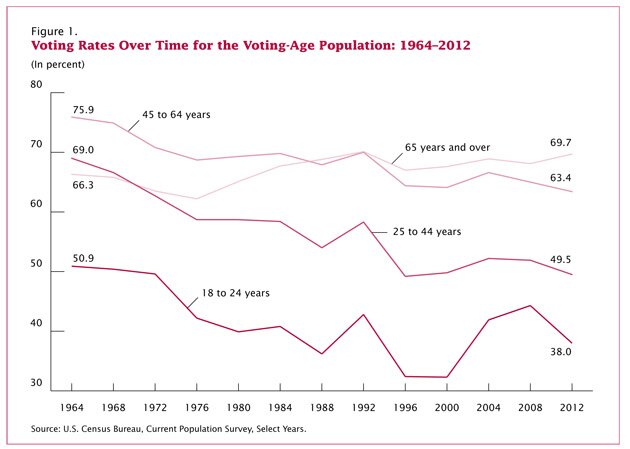Why don’t young people vote?
|
It’s become a truism in this country that young people don’t vote. According to a 2014 U.S. Census analysis (pdf), voting rates among 18-24 year old voters declined from 50.9 percent in 1964 to a 38 percent today, having reached a low point of slightly more than 30 percent in 1996 and 2000.
Why don’t young people vote? Maybe we’re disillusioned by partisanship, cynicism and a perceived lack of progress. Maybe, because most of us don’t yet have children and own property, we feel we don’t have a stake in how the government is run. Or maybe we’re just not informed and not interested (pdf).
I’d like to suggest a different reason. I think young people don’t vote because candidates don’t talk about the issues that, for us, matter the most.
To the extent that many candidates try to mobilize young people, “young people’s issues” are often something of an add-on, and are rarely at the center of a platform. When candidates do attempt to mobilize the youth vote, they do so by being glib: they try to make a candidate seem cool or trendy, or include in their platform a few conventional young people’s issues like student debt forgiveness
What are some real young people’s issues? Here are three fundamental realities that will shape our country for the rest of our lives:
1 – Americans live much longer now than they used to.
2 – Healthcare costs are growing much faster than the rest of the economy (even taking into account the Affordable Care Act).
3 – Our population base will become less broad: it will consist of larger numbers of old people and smaller numbers of young and middle-aged people.
These three fundamental societal shifts are primary drivers of almost every issue you can imagine. What should we do about our entitlement programs? How should we design our immigration system? What should our healthcare, biomedical research and biotech enterprises look like?
Over the coming decades, our responses to these three fundamental realities will determine our country’s financial health. They will determine our economic competitiveness, redefine the relationship between the individual and the state, and reshape our standing in the world. It is not an overstatement to say these shifts and our responses to them will determine our very way of life.
It is hard for me to imagine what could be more important for young voters than these three issues. I find myself constantly frustrated with the candidates of both major parties. Why aren’t they addressing these issues to reach young voters like me? Why isn’t anyone talking to young people about this stuff?
At the end of the day, though, I’m mostly disappointed by other young people. Our politicians and political parties aren’t obligated to speak to anyone about anything. When the rubber hits the road, it’s our job as citizens to make them care about these issues.
As my generation gets older, we will almost certainly become more politically engaged. At the same time, I think these issues will play a larger and larger role in our public discourse.
Who will use these issues to reach young voters? Which candidates will tap into them? Which parties?
I don’t know who it will be or when it will happen, but I think any candidate or party that can develop a positive, constructive message that speaks to young people by addressing these three shifts will win a lot of elections over the next few decades.
Isaac Weitzhandler, from Sunnyvale, California, is an MA candidate in bioethics and science policy and a Ph.D. student in biomedical engineering.

Isaac Weitzhandler
Isaac Weitzhandler, from Sunnyvale, California, is an MA candidate in bioethics and science policy and a Ph.D. student in biomedical engineering.
More Info

